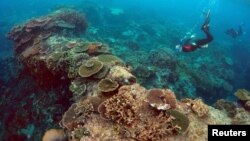The heritage committee of the UNESCO cultural agency said on Wednesday that the outlook for Australia's Great Barrier Reef was poor due to threats including pollution and climate change but stopped short of listing it as "in danger".
Some environmental campaigners had urged the committee to declare the reef in danger, a ruling that would have put pressure on Prime Minister Tony Abbott to take tougher conservation measures.
The decision upheld a draft deal signed in May that was a relief for Canberra. Australia plans to safeguard the reef until 2050 with extra spending to limit pollution and restrictions on developing of new ports.
"Climate change, poor water quality and impacts from coastal development are major threats to the property's health," the World Heritage Committee of the U.N. Educational, Scientific and Cultural Organization (UNESCO) said in a decision adopted at talks in Bonn.
The committee lists 45 sites worldwide in danger, from corals in Belize to the city of Timbuktu in Mali. A listing is an embarrassment to governments and means the committee draws up a non-binding list of actions to restore sites.
The reef, which stretches 2,000 kms (1,200 miles) along Australia's coast, is the world's largest living ecosystem, and brings in billions of dollars a year in tourism revenues.
Australia announced an extra A$8 million ($6.2 million) for reef monitoring at the Bonn talks, saying it had "clearly heard" the concerns of the committee and of environmental groups.
In May, Australia said it would more than double an area near the Great Barrier Reef subject to special curbs on shipping.
"The plan now needs to translate into action, backed by adequate finance and rigorous science," said Tim Badman of the International Union for Conservation of Nature.
Greenpeace said that the reef was in danger from planned coal mining in the Galilee Basin in Queensland.
"Until the plans for the massive coal mine and port expansion are dropped, it's impossible to take Australia's claims that they are protecting the reef seriously," Greenpeace's Jess Panegyres said.
Dermot O'Gorman, of the WWF conservation group, said that the committee's decision "places Australia on probation".





